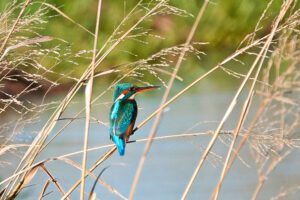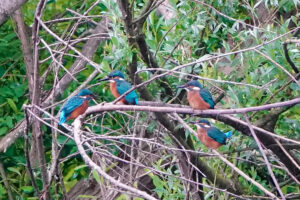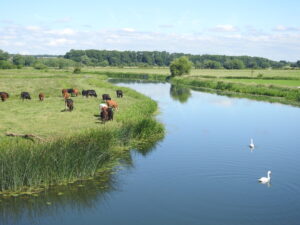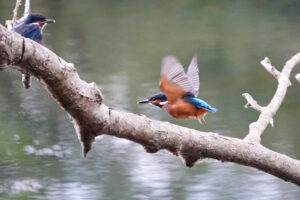Nick Penny’s ‘Call of the Kingfisher’ is a reminder that regular paths walked can lead to irregular and surprising encounters, writes Ceri Levy.

Nick Penny has walked a local stretch of the river Nene at Oundle in Northamptonshire for over three decades, and after a chance encounter with a kingfisher on New Year’s Day, he decided to document a year by the river and his experiences along the way. For the next twelve months he went in search of the river’s birdlife, wildlife, sounds and sights. He chronicled his discoveries in his diary, now published as Call of the Kingfisher.
A kingfisher started his journey, and the species accompanies him throughout the book — Penny never loses the wonder that every chance encounter with this spectacular river jewel brings. A flash of blue, a glint of orange, the behaviour, the courtship, the nesting, the rearing of young are all part of the year’s cycle recorded by the author. And if the kingfisher was the key to the project, it unlocked so much more along the way. A time spent by a river can be contemplative and full of musings and Penny gives himself up to becoming part of the place.
… a long period of anxiety began to lift after I stopped on a desperate winter evening’s walk to listen to dry beech leaves rustling in the wind. It was the first time I’d notice anything outside of the swirl of my mind and emotions for months, and it was a turning point. I came away with the conviction that everything I needed to thrive, and everything I needed to learn about the world, was within walking distance of my own front door. After that I walked near the river and through woods and forests every day that I could. And I made sure that I never stopped looking and listening.
The diary format is a perfect vehicle for writing about nature because of the nature of nature. As the seasons come and go, so do the species associated with each one. Winter species take their moment in the limelight and then pass the baton to those of the spring, and the same changeover happens through summer and autumn. As I write, the winter redwings and fieldfare have recently departed, and I wait for the spring birds to arrive and sing their songs created for longer days. I can already hear the crazed screaming and shouting from a resident song thrush, aware of impending spring, urging us to get ready for more light and less rain. Penny’s observational documentation captures this process of continual change.

Call of the Kingfisher is an odyssey of simple joy, filled with historical facts and stories, where the writer makes us feel part of the journey. It’s like strolling the riverbank with a friend — and is a timely reminder that regular paths walked can lead to irregular and surprising encounters.
On the way back to Oundle there’s a snipe drumming over Snipe Meadow. It makes a fast circular flight that dips now and then so that its feathers vibrate, or drum, with a thin braying sound. Spinning round to watch it leaves me giddy and excited. It’s the first time I’ve heard one here in about 20 years. I’m itching to tell someone. Luckily a regular walker comes along with his grandson, and I share the experience with them.
Being a musician and sound recordist, Penny creates a nice touch of engagement for the reader, by allowing them to access his online audio recordings to accompany certain passages of the book. He writes about the dawn chorus at Glapthorn, and one QR click later, the cacophonous early morning singing accompanies the text. It’s an added level of enjoyment as kingfishers, nightingales, cuckoos, and willow warblers burst into life while reading about them.

Penny shows the depth and breadth of the natural world and its history on his doorstep — just as many of us now understand that there is beauty and magic not far from anyone. These sites have become increasingly popular and resonate deeply for lots of people who had never been previously intrigued by nature and its power.
I realised a long time ago that a hole appears around you as you walk in nature. If you stop and sit for 20 minutes and move nothing but your eyes, it will fill in again, and you’ll see and hear all sorts of things. I’d thought that was because birds and animals were naturally wary of a moving human, and only gradually went back to what they were doing before. Then I realised that it’s me who changes too. If I sit still and observe for 20 minutes the breathing slows, the body disappears. Things come and go without undue physical or mental reactions. It’s a form of meditation that opens you out to the world.
Call of the Kingfisher inspires us to discover a little pocket of the world that we can enjoy time and again and is a reminder that we are all part of nature and can join in any time. The more we engage with it, the more likely we are to elicit change and help our local environment. It’s all a sense of belonging. Nature will never turn us away and perhaps we are learning to accept the invitation. Who knows, you may hear the call of the kingfisher beckoning you to the river. Will you follow the sound?

*
‘Call of the Kingfisher’ by Nick Penny is published by Bradt Guides. Buy a copy here (£9.49).